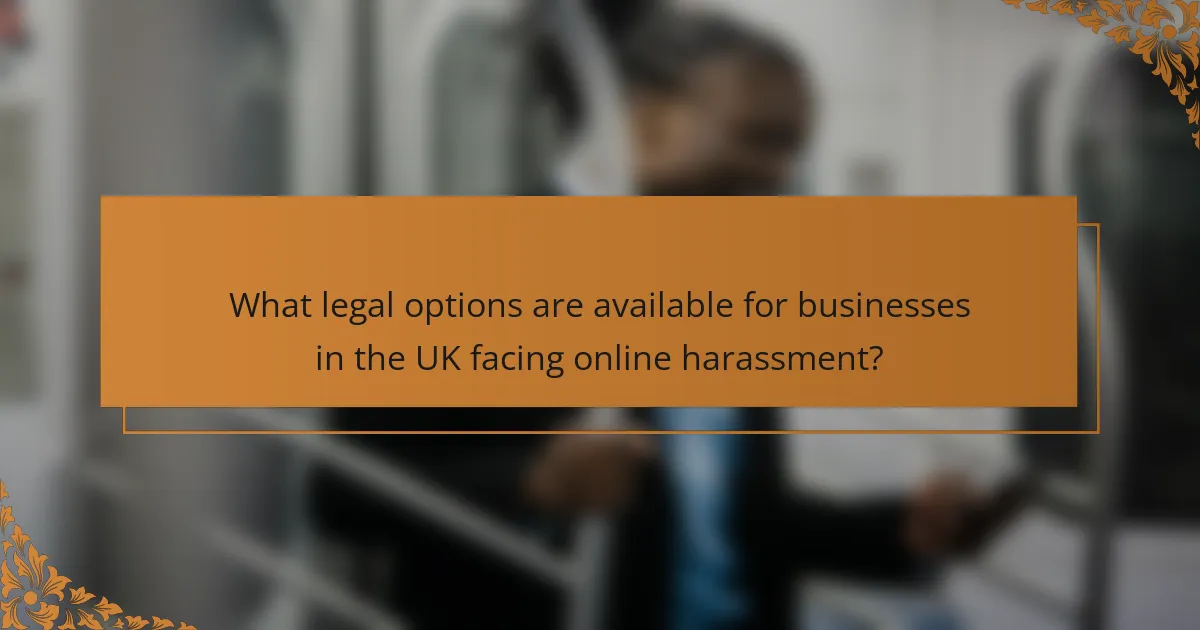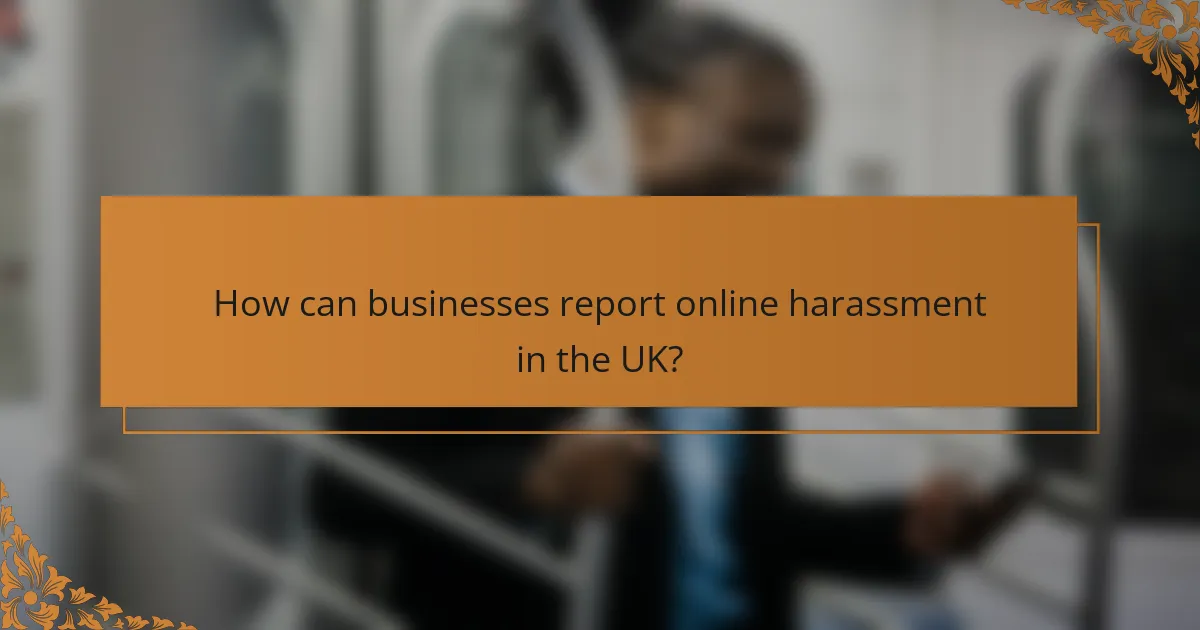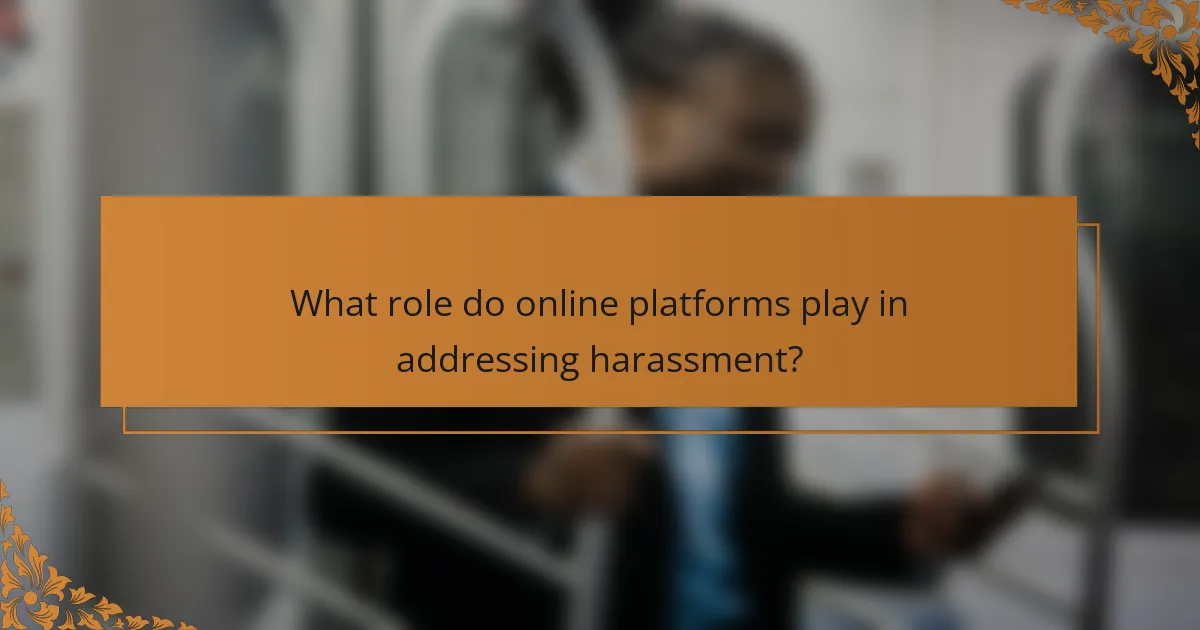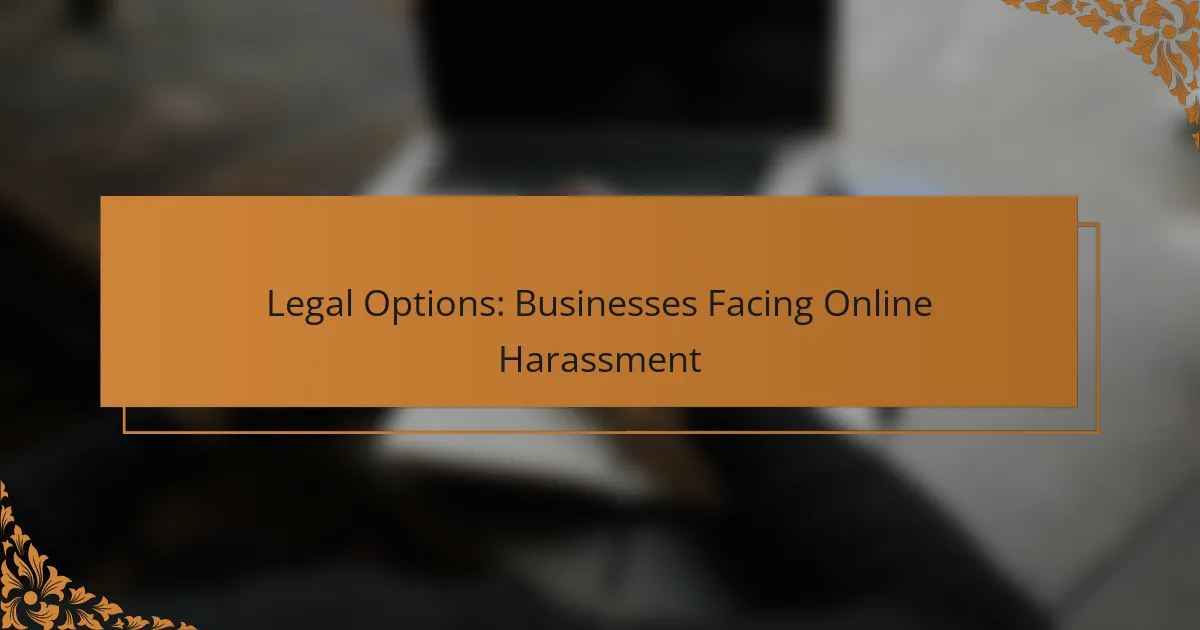Businesses in the UK facing online harassment have a range of legal options available to them, including defamation claims and harassment injunctions. Understanding these options, along with the procedures for reporting incidents and implementing protective strategies, is crucial for effectively addressing and mitigating the impact of online harassment.

What legal options are available for businesses in the UK facing online harassment?
Businesses in the UK facing online harassment have several legal options to consider, including defamation claims, harassment injunctions, data protection complaints, cyberbullying laws, and intellectual property protections. Each option has specific requirements and implications that businesses should understand to effectively address online harassment.
Defamation claims
Defamation claims allow businesses to seek legal recourse if false statements are made online that harm their reputation. To succeed, a business must prove that the statement was untrue, damaging, and published to a third party. This process can be lengthy and may require substantial evidence.
Businesses should document all instances of defamation, including screenshots and URLs, and consider consulting a legal professional to evaluate the strength of their case. Legal action can lead to damages or a retraction of the defamatory statement.
Harassment injunctions
Harassment injunctions can be sought to prevent ongoing online harassment. If a business can demonstrate that the harassment is persistent and causes distress, a court may issue an injunction prohibiting the harasser from further contact. This legal remedy can provide immediate relief and protection.
To apply for an injunction, businesses should gather evidence of the harassment, such as messages or posts, and seek legal advice to navigate the court process effectively.
Data protection complaints
Businesses can file data protection complaints if online harassment involves the misuse of personal data. Under the UK General Data Protection Regulation (GDPR), individuals have rights regarding their personal information, and businesses can report violations to the Information Commissioner’s Office (ICO).
To file a complaint, businesses should document how their data is being misused and provide evidence to support their claim. The ICO can investigate and impose fines on those who violate data protection laws.
Cyberbullying laws
Cyberbullying laws in the UK address online harassment that targets individuals, including employees of a business. While there is no specific law for cyberbullying, existing laws on harassment and communications can be applied. Businesses can take action if the harassment affects their operations or employee well-being.
Employers should have clear policies against cyberbullying and provide support for affected employees. Reporting incidents to law enforcement may also be necessary if threats or violence are involved.
Intellectual property protections
Intellectual property protections can be crucial for businesses facing online harassment that infringes on their trademarks or copyrights. If someone uses a business’s intellectual property without permission in a harassing manner, the business may have grounds for legal action.
Businesses should monitor their intellectual property online and take swift action against unauthorized use. This may include sending cease-and-desist letters or pursuing legal claims to protect their rights.

How can businesses report online harassment in the UK?
Businesses in the UK can report online harassment through various channels, including law enforcement, social media platforms, and regulatory bodies. Each method has specific procedures and considerations that can help address the issue effectively.
Contacting law enforcement
If online harassment escalates to threats or criminal behavior, businesses should contact law enforcement immediately. The police can investigate incidents that involve harassment, stalking, or hate crimes, and they may take action against the perpetrators.
When reporting to the police, gather evidence such as screenshots, URLs, and timestamps. This documentation will support your case and help law enforcement understand the severity of the situation.
Reporting to social media platforms
Most social media platforms have specific reporting tools for users experiencing harassment. Businesses should utilize these tools to report abusive content or accounts, which can lead to the removal of harmful posts or even account suspension.
Each platform has its own guidelines and response times, so familiarize yourself with the reporting process for each site. For example, Facebook and Twitter provide detailed instructions on how to report harassment, which can expedite the resolution process.
Filing complaints with regulatory bodies
In the UK, businesses can file complaints with regulatory bodies such as the Information Commissioner’s Office (ICO) if the harassment involves data protection violations. The ICO can investigate breaches of the Data Protection Act and take necessary actions against offenders.
Additionally, businesses may consider contacting organizations like the Advertising Standards Authority (ASA) if the harassment involves misleading advertising or harmful content. Understanding the specific regulations relevant to your case can help in effectively addressing the harassment.

What steps should businesses take to protect themselves from online harassment?
Businesses can protect themselves from online harassment by implementing comprehensive strategies that include cybersecurity measures, clear policies, and staff training. These steps help create a safer online environment and mitigate potential risks associated with harassment.
Implementing robust cybersecurity measures
Robust cybersecurity measures are essential for businesses to defend against online harassment. This includes using firewalls, antivirus software, and secure passwords to protect sensitive information. Regular updates and patches to software systems also help close vulnerabilities that could be exploited by harassers.
Additionally, businesses should consider employing encryption for sensitive communications and data storage. Utilizing multi-factor authentication can further enhance security by requiring multiple forms of verification before access is granted.
Establishing a clear harassment policy
A clear harassment policy outlines acceptable behavior and the consequences for violations. This policy should be easily accessible to all employees and include definitions of harassment, reporting procedures, and disciplinary actions. Regularly reviewing and updating the policy ensures it remains relevant and effective.
Businesses should communicate this policy during onboarding and conduct periodic training sessions to reinforce its importance. Encouraging an open dialogue about harassment can help create a culture of accountability and support within the organization.
Training staff on online safety
Training staff on online safety is crucial for preventing and responding to harassment. Employees should be educated on recognizing signs of online harassment and the appropriate steps to take if they encounter it. This training can include practical exercises and role-playing scenarios to enhance understanding.
Additionally, businesses should provide resources and support for employees who may be affected by harassment. Establishing a clear point of contact for reporting incidents can empower staff to take action and foster a safer workplace environment.

What are the potential consequences of online harassment for businesses?
Online harassment can lead to severe consequences for businesses, impacting their reputation, legal standing, and financial health. Companies must understand these risks to effectively mitigate them and protect their interests.
Reputational damage
Reputational damage occurs when negative online interactions tarnish a business’s image. This can result from false information, targeted harassment, or negative reviews that spread rapidly across social media platforms.
To manage reputational damage, businesses should actively monitor their online presence and engage with customers transparently. Quick responses to allegations or negative comments can help mitigate potential fallout.
Legal liabilities
Legal liabilities arise when online harassment violates laws or regulations, such as defamation or harassment statutes. Businesses may face lawsuits from affected parties, leading to costly legal battles and settlements.
To minimize legal risks, companies should implement clear policies against harassment and provide training for employees on appropriate online conduct. Consulting with legal experts can also help navigate complex regulations.
Financial losses
Financial losses can stem from various sources, including decreased sales, legal fees, and damage control efforts. A business facing online harassment may see a decline in customer trust, leading to reduced revenue.
To protect against financial losses, businesses should invest in crisis management strategies and consider insurance options that cover reputational harm. Regularly assessing the financial impact of online harassment can help in planning and resource allocation.

How can businesses leverage legal resources for online harassment issues?
Businesses facing online harassment can utilize various legal resources to protect their interests and mitigate damage. Engaging with legal experts and online legal platforms can provide essential guidance and support in navigating these complex situations.
Consulting with legal experts
Consulting with legal experts is a crucial step for businesses dealing with online harassment. Attorneys specializing in cyber law can offer tailored advice on the legal implications of harassment and the best courses of action. They can help identify applicable laws, such as defamation or harassment statutes, and guide businesses on how to document incidents effectively.
When choosing a legal expert, consider their experience with online harassment cases and their familiarity with local laws. It’s beneficial to have an initial consultation to discuss your specific situation and understand potential legal remedies, which may include cease-and-desist letters or pursuing litigation.
Utilizing online legal platforms
Online legal platforms can serve as valuable resources for businesses facing online harassment. These platforms often provide access to legal documents, templates, and advice at a lower cost than traditional legal services. They can help businesses draft necessary communications or legal filings quickly and efficiently.
When using online legal services, ensure they are reputable and have positive reviews. Look for platforms that offer specific resources related to online harassment, such as guides on reporting harassment to social media companies or filing complaints with law enforcement. This can streamline the process and empower businesses to take action effectively.

What role do online platforms play in addressing harassment?
Online platforms are crucial in managing and mitigating harassment by providing tools and policies that protect users. They establish community guidelines, monitor content, and offer reporting mechanisms to address abusive behavior effectively.
Content moderation policies
Content moderation policies are the frameworks that online platforms use to identify and manage harassment. These policies outline what constitutes unacceptable behavior, including hate speech, threats, and bullying. Platforms like Facebook and Twitter employ a combination of automated systems and human moderators to enforce these guidelines.
Businesses should familiarize themselves with the specific policies of the platforms they use. Understanding these rules can help in reporting incidents effectively and ensuring that appropriate actions are taken against harassers.
Reporting mechanisms
Reporting mechanisms allow users to flag inappropriate content or behavior directly to the platform. Most platforms provide a straightforward process for reporting harassment, which often includes options to block or mute offenders. This immediate action can help reduce the impact of harassment on businesses and individuals.
When using these mechanisms, it’s essential to provide as much detail as possible in the report. Include screenshots, timestamps, and descriptions of the incidents to facilitate a thorough investigation by the platform.
Legal obligations and liability
Online platforms have legal obligations to address harassment under various laws, such as the Communications Decency Act in the United States. While platforms are generally not liable for user-generated content, they can face consequences if they fail to act on reported harassment. This legal framework encourages platforms to take user reports seriously.
Businesses should be aware of these legal obligations and consider consulting legal counsel if they face persistent harassment. Understanding the legal landscape can help businesses navigate their options and protect their interests effectively.
